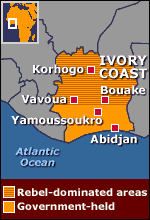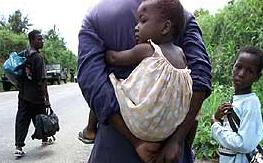|
COTE D'IVOIRE
AND WAR CRIMES As predicted, the unfolding drama in this once-upon-a-time oasis of stability in the West African sub-region is going to present quite a tough nut to ECOWAS peace mediators. It would appear that with each softening up of the previous hard line stance of the Gbagbo government, the rebels thrust in more of their demands in the hope that at the end of the day, they would have achieved what they originally set out to do - having a government of their choice in power. That the rebels should have pushed up their demands when all appeared to have been going well in the effort to bring both sides to an agreeable settlement should not come as any surprise to watchers of crisis and conflicts in the sub-region. It has been standard fare on the menu of the kind of diplomacy that has been favoured by the Abidjan authorities even as they "mediated" between the Revolutionary United Front (RUF) of Sierra Leone and the government. The Sierra Herald had in a previous issue highlighted similarities between demands of the rebels and those of the RUF. It is to be recalled that Sam Bockarie, the chief executioner of the RUF terror machine had never publicly called for the resignation of President Tejan Kabbah and did that for the first time in 1999 in a BBC interview when ECOWAS and other international concerns realised the toll in human lives and misery after that incursion by the AFRC/RUF coalition of evil. And one need not forget that Eyadema, Togo's dinosaur "President for Life" was also involved in those crucial negotiations. They had wanted Blaise Campaore to chair such a meeting, but he would have stayed put knowing that the Nigerians and indeed the other countries had an idea of his role in turning the sub-region into a killing field!! Reports from the negotiating table have suggested that despite what had been hailed as progress in maintaining the thin line that separates the two forces, the rebels demand that the elected government should resign and that fresh elections must be held again gives the game away. Some interests somewhere just do not like the continuation of the Gbagbo government and would use any means to achieve this. These are the forces that are behind the hastily arranged label of convenience called the Patriotic Movement of Cote d'Ivoire and given a reading of the situation are to be found outside the boundaries of the country as well as within. It is left to the imagination of the kind of scenario that would emerge should fresh elections be held that are won by Gbagbo. Claims of rigging would not be far off until the rebels see their own man in power!! While the peace brokers try to assuage the fears of the rebels by the granting of an amnesty that gives them a blanket pardon for what they could have done, ECOWAS, and indeed the international community must be aware that such amnesties must not in any way send signals to would-be coup makers and hell raisers that they could always get away with the murder and mayhem visited upon the civilian population. And that is why the Sierra Herald would continue to call for those alleged to have committed human rights violations to be brought to justice. Geoffrey Robertson QC and other human rights lawyers have noted the obligation of other states in enforcing international law even where blanket amnesties are used as weapons of convenience and subterfuge. Robertson in his book, "Crimes Against Humanity -the struggle for global justice" has noted:
The granting of blanket amnesties would appear to provide the safe corridors strode by human rights violators, allowing potential abusers not to bat an eyelid in committing atrocities against perceived enemies. Human
rights observers must now be allowed into rebel-held areas to document
what appears to be on-going violations and desperate cover-up operations
aimed at "wiping out" bits and pieces of evidence. There had been
reports of both sides hunting for perceived supporters of the adversary
and subjecting them to abuses that include rape, torture and summary
executions. The evil that could be lurking in areas under the control of
the rebels could be imagined given reports that men and youths within
rebel territory are no longer allowed to leave fuelling speculations
that forceful conscription has become one of the rules under the rebels.
Recent reports of demonstrations being held in support of the rebels are bound to be greeted with scepticism by Sierra Leoneans who suffered under the AFRC/RUF coalition of evil. How these demonstrations in support of the murderous junta were orchestrated could perhaps be best articulated by a former Information minister in that regime who had been described by one British newspaper as the "Goebbels of West Africa". The man, Mohamed Bangura is thought to be holed up in south London basking in the glow of human rights provisions in the laws of the United Kingdom. Sierra Leoneans hope, that he and others of his type would one day be asked to account for their deeds as the country struggles in coming to terms with the enormity of the evil unleashed upon it. Human rights representatives must also be allowed to document atrocities committed by supporters of the government against foreigners and others thought to be in support of the rebels. According to reports monitored from the region, it has been difficult to get the true figures of foreigners killed or maimed or to put a figure to the loss in assets. Statements by President Gbagbo and his ministers urging their supporters to target foreigners must be carefully studied by law makers to see if, given the urgent security situation then, the government was out of order in encouraging those attacks. The Gbagbo
government has to be made aware also of the provisions within
international law which among other things, makes it an offence to
target any group of people because of their ethnic origin, political
leanings, religion or otherwise. From across the spectrum that takes in
the Courts in Yugoslavia, Rwanda and Sierra Leone, the international
community's rejection of crimes against groups/persons in an organised
manner are clearly defined and reports that people belonging to a
religious group are being hunted and killed should give rise to concerns
that serious human rights violations are being perpetrated in Cote
d'Ivoire and must be investigated. |

